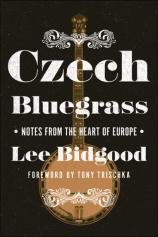Czech Bluegrass: Notes from the Heart of Europe
Review
Czech Bluegrass: Notes from the Heart of Europe
Can a purely American musical genre “translate” to a foreign language and flourish in a foreign milieu? These questions are at the core of music professor Lee Bidgood’s exploration of a seemingly impossible, or at least highly unlikely, cultural fusion --- Czech bluegrass.
Bidgood is uniquely qualified to write about this multi-faceted subject, having spent long periods of time in the Czech Republic, beginning with a 2002-03 Fulbright student grant that allowed him not only to participate in Czech bluegrass as a player and folk music scholar, but to produce a documentary film about it (Banjo Romantika, 2015). He states that American folk or country-style music infiltrated Eastern Europe during and following World War I, when a phenomenon called “tramping” took hold of a restless young population.
"Bidgood’s personalized analysis adds a significant, scholarly piece to the bigger picture of bluegrass as an international phenomenon."
The trauma of war was, for some, an impetus to go out “into nature,” and this activity melded with the excitement of American Western novels and the heartfelt southern American tunes being played on the radio, providing a strong artistic allure. An industry grew up to supply the instruments needed to produce this acoustic music (though the Czechs can claim partial parentage of one instrument, the dobro or resophonic guitar, strongly associated with American bluegrass).
The result has been an interesting combination of sounds and, just as importantly, ideation. Bidgood suggests that the most resilient definition would be “in-betweenness.” Czech bluegrassers may write their own lyrics --- soulful, simple words that echo the home-and-hearth nostalgia of the American genre, such as this English rendering of lyrics by Peter Kůs:“My path has a far-off goal; I can recall how I’ve lived here; I can hardly hide the tears; on the page of these memories.” But as often, Czech pickers launch into American favorites, articulating the lyrics as well as they can, imitating Appalachian intonations like those of the music’s acknowledged progenitor, Bill Monroe.
The author notes some cultural differences that would make in-betweenness seem like an understatement to American bluegrass fans --- notably the average Czech musician’s lack of religion. Czechs approach bluegrass gospel with a certain sense of irony. Bidgood sagely refers to this distanced awareness as “the constructedness of the Czech imaginings of America.” Czechs, knowing that the divide exists, like to joke that Bill Monroe heard bluegrass first from the Czech Republic.
Bidgood’s personalized analysis adds a significant, scholarly piece to the bigger picture of bluegrass as an international phenomenon. He concludes that though bluegrass is and will remain essentially an “Americanist” musical mode, we can examine and appreciate its tendency to set roots elsewhere.
Reviewed by Barbara Bamberger Scott on December 8, 2017
Czech Bluegrass: Notes from the Heart of Europe
- Publication Date: September 11, 2017
- Genres: Music, Nonfiction
- Paperback: 192 pages
- Publisher: University of Illinois Press
- ISBN-10: 0252083008
- ISBN-13: 9780252083006



